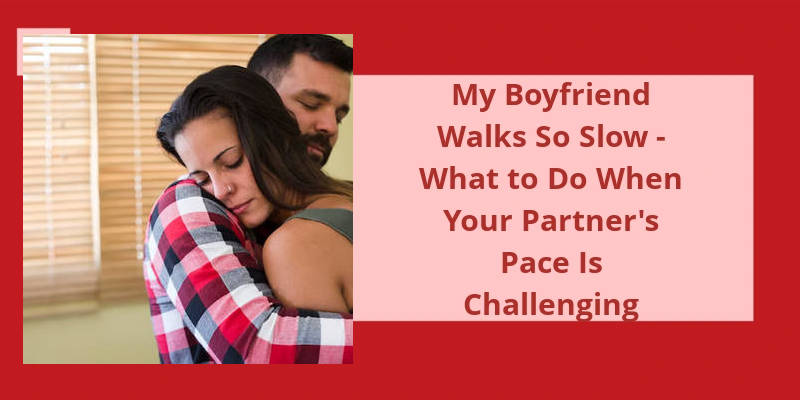When it comes to walking together as a couple, it's not uncommon to notice a difference in pace between partners. Some may naturally walk at a brisk pace, while others prefer a slower, more leisurely stroll. However, if you find yourself constantly lagging behind while your boyfriend walks at a frustratingly slow speed, it can be a source of annoyance and impatience. Understanding the reasons for this disparity can help you tackle the issue in a more empathetic and effective way. Recent research suggests that men tend to slow down when they’re in love or walking with their romantic partners, even if they aren’t physically holding hands. This fascinating phenomenon isn’t observed when men walk with female friends, indicating that it may be specifically influenced by the emotional connection between partners. Recognizing and addressing this dynamic can be crucial in finding a balanced and harmonious rhythm that suits both you and your partner on your shared journeys.
What Does It Mean When a Guy Walks Slower Than You?
When you notice that your boyfriend walks slower than you, it can actually be a positive sign for your relationship. This change in pace could potentially indicate that he’s smitten with you and wants to savor every moment spent together. Men often display this behavior when they’re walking with the woman they love. It signifies a desire to create a stronger connection and a willingness to adjust their natural rhythm to match yours.
Slowing down his stride could be your partners way of showing care and consideration towards you. By adjusting his pace to match yours, he’s acknowledging and prioritizing your comfort and needs. This subtle act of slowing down can create a deeper sense of intimacy and connection between partners. It signifies a willingness to be in sync with each other, to experience life side by side, even in something as simple as walking.
In any case, it’s always good to communicate openly with your partner and have a conversation about your walking speeds. If it bothers you or makes you feel uncomfortable, kindly express your concerns and find a compromise that works for both of you. It’s essential to find a balance where both partners feel comfortable and respected in the relationship, even when it comes to something as simple as walking.
The Psychology Behind Walking Speeds in Relationships
Walking speed in relationships can be influenced by several psychological factors.
One possible explanation is that people naturally have different walking speeds due to their physical attributes, such as height, leg length, and fitness levels. These individual differences can lead to one partner naturally walking faster or slower than the other.
Another psychological factor that can affect walking speeds in relationships is personality traits. For example, someone who’s more goal-oriented or impatient may naturally walk faster, while someone who’s more relaxed or contemplative may walk at a slower pace.
Additionally, past experiences and cultural differences can also contribute to differences in walking speeds. For instance, growing up in a crowded city where fast-paced walking is the norm may influence someone to walk faster, while someone from a more rural or laid-back environment may have a slower walking speed.
It’s important to note that walking speeds in relationships aren’t indicative of the strength or compatibility of the partnership. However, if the difference in walking speeds becomes a source of tension or frustration, open communication and compromise are key. Couples can discuss their preferences, find a middle ground, or even take turns setting the pace during walks to ensure both partners feel comfortable and valued.
Recent research from Washington suggests that men’s walking pace slows down significantly when they’re in the presence of someone they’re romantically interested in. This fascinating study reveals that men tend to modify their walking speed when accompanied by a female partner, indicating a possible subconscious sign of attraction.
Do Guys Walk Slow Around Their Crush?
In a fascinating new study conducted in Washington, researchers have discovered an intriguing behavior exhibited by men when walking next to women theyre dating. It seems that men tend to slow down significantly in their walking pace when in the presence of their romantic interests, compared to when they’re walking alone or with friends. This finding has shed light on the notion that a persons walking speed can be indicative of their level of interest and connection with someone.
So, why do guys walk slow around their crush? The study suggests that this slower pace might be a subconscious way for men to demonstrate their attentiveness and desire to spend more time with their partner. It can be seen as a subtle gesture of affection and a means of creating a closer bond. By slowing down, men are able to match their partners pace and ensure that they’re able to maintain physical proximity, allowing for more opportunities for intimate conversations and shared moments.
This behavior may be rooted in evolutionary psychology as well. It showcases a willingness to adapt and accommodate their partners needs, showing that they’re attentive and considerate.
However, it’s important to note that everyone is unique, and behaviors may vary from person to person. Communication and understanding between partners are crucial to ensure that both individuals feel comfortable and valued in the relationship, regardless of walking speed.
It’s often said that our walking speed can reveal a lot about our overall health. Researchers have found that a reduced pace might indicate the early stages of heart failure, dementia, or cardiac disease. Recognizing the significance of this warning sign could help individuals take proactive measures in managing their well-being.
What Causes Me to Walk Slowly?
Walking slowly can be caused by a variety of factors, some of which may indicate underlying health issues. One potential cause is heart failure, a condition in which the heart is unable to pump enough blood to meet the bodys needs. As a result, individuals with heart failure may experience fatigue and shortness of breath, contributing to a slower walking pace.
Dementia, a progressive neurological disorder, can also significantly affect ones walking speed. As the disease advances, individuals may experience problems with coordination and balance, leading to a slower and more cautious gait. In some cases, cognitive impairments associated with dementia may also contribute to a reduced pace.
Research has shown that how fast we walk can provide valuable insights into our overall health. A slower pace has been linked to an increased risk of mortality and various health conditions, making it an important marker to monitor. Therefore, if you notice that your partner walks slow consistently, it may be beneficial to encourage them to seek medical advice to determine the underlying cause and receive appropriate treatment if necessary.
Lastly, it’s important to approach the topic of your partners slow walking pace with empathy and support. They may already be aware of their reduced speed and possibly feel frustrated or self-conscious about it. Open and honest communication can help create a safe space for discussing any concerns and finding potential solutions together, whether it be through seeking medical intervention, incorporating physical activity, or making lifestyle changes.
Source: Walking slowly could be an early warning sign of illness
Navigating the early stages of a relationship can be both exhilarating and confusing, especially when one person expresses a desire to take things slow. Although every guy is different, it typically suggests that he wants to establish a comfortable and steady pace for developing intimacy, connection, feelings, and commitments. Understanding this mindset can shed light on his intentions and help create a foundation of trust and mutual understanding.
Why Is He Taking It So Slow With Me?
When a guy says he wants to take it slow in a relationship, it can be confusing and leave you wondering why hes not moving at the same pace as you. However, it’s important to understand that not every guy is the same, and his desire to take things slow could stem from various reasons. Typically, when a guy expresses this sentiment, it indicates a desire for the pace of the relationship to be one that feels comfortable for both partners.
Additionally, a guy may want to take it slow because he values you and wants to give the relationship the time and attention it deserves. By taking the time to get to know each other on a deeper level, hes building a strong foundation for a lasting and meaningful connection. This slow pace allows for authentic bonding and a better understanding of each others needs and expectations.
It’s important to keep in mind that the pace at which a relationship progresses should always be based on mutual consent and comfort. If you find yourself becoming frustrated with the slow pace, it’s crucial to have an open and honest conversation with your partner. Express your own needs and concerns while also respecting his perspective. Communication is key in any relationship, and discussing your expectations can help both of you find a balance that works for both parties.
This could be influenced by past experiences, emotional readiness, or simply a desire to build a strong foundation. It’s important to have open communication with your partner to ensure that both of your needs are being met and that the relationship progresses in a way that feels right for both of you.
The way a woman walks can vary based on a multitude of factors, such as her current state of mind, urgency, physical attributes, and self-assurance. Some women naturally have a graceful stride, while others may not possess the same level of sway. Weight, body size, and confidence level can all influence a woman’s walking speed and style, adding to the unique qualities of her movements.
What Does It Mean When a Woman Walks Slow?
When a woman walks slowly, it can have a variety of meanings. One possibility is that she may have something on her mind that’s causing her to move at a slower pace. It could be that she’s deep in thought, processing certain emotions, or simply preoccupied with something that’s weighing on her. This slower pace could also indicate a pause in her usual energetic and fast-paced demeanor.
On the other hand, a woman may also walk slowly if she’s feeling physically fatigued or unwell. It could be a sign that she’s taking the time to listen to her body and prioritize self-care. This slower gait could be temporary and may resolve once she’s rested or regained her strength.
It’s important to note that a womans walking speed can also be influenced by factors such as weight, size, body type, or confidence level. Some women may naturally have a more leisurely or deliberate stride, while others may have a more brisk and energetic pace. These differences are subjective and unique to each individual. It isn’t necessarily an indicator of anything negative, but rather a reflection of personal style and comfort.
If she’s in a hurry or trying to reach a specific destination quickly, she may adopt a faster pace. Conversely, if she’s in a relaxed setting or taking in her surroundings, she may choose to walk more slowly and enjoy the moment.
In any case, it’s important to remember that walking speed alone doesn’t define a womans worth or character. It’s merely one aspect of her individuality and should be respected as such. Instead of making assumptions based on someones pace, it’s more helpful to engage in open and honest communication to better understand their perspective. By approaching the situation with empathy and compassion, both partners can navigate any challenges that arise from differences in walking speed.
The Impact of Cultural Norms and Expectations on Walking Speed for Women
Cultural norms and expectations can greatly influence walking speed, particularly for women. In many cultures, women are often expected to walk gracefully, delicately, and at a slower pace compared to men. These expectations are deeply rooted in traditional gender roles and societal perceptions of femininity. As a result, women may feel pressured to conform to these norms, even if it means walking at a slower pace than what feels natural or comfortable for them.
It’s important to recognize that walking speed is highly individual and varies among individuals, regardless of gender. However, societal pressure can create frustration and dissatisfaction when one’s partner walks significantly slower or faster than expected. If you find yourself in a situation where your partner’s pace is challenging, open and honest communication is key. Express your feelings and concerns, and try to understand each other’s perspective. Finding a compromise that works for both of you can help maintain harmony and understanding in your relationship.
Additionally, it’s crucial to challenge societal norms and expectations that dictate how women should walk. Embracing and celebrating individuality, whether it’s in walking speed or any other aspect of life, helps in breaking free from gender stereotypes and promoting equality. Remember, walking speed shouldn’t define a person’s worth or femininity. It’s essential to prioritize personal comfort and well-being above societal expectations.
Conclusion
In conclusion, it’s important to understand that the pace at which our partners walk can have various underlying reasons, and it may not always be a reflection of their interest or care towards us. The study suggests that men tend to slow down when they’re in love, adjusting their speed to match their romantic partner's pace. Instead of becoming frustrated or try to change our partner's pace, it’s crucial to communicate openly, find compromises, and embrace the differences that exist within our relationships. Ultimately, it’s through understanding, empathy, and mutual respect that we can navigate and overcome the challenges that arise, ensuring a harmonious and fulfilling partnership.






